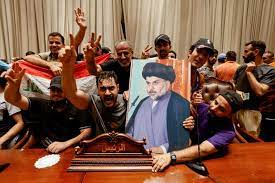
Feeling threatened, Sadrists storm Iraqi parliament to block premiership of pro-Maliki nominee | | AW
BAGHDAD, Iraq-
Hundreds of Iraqi protesters breached Baghdad’s parliament Wednesday chanting anti-Iran slogans. This came after thousands of supporters of the Sadrist movement flocked to Tahrir Square in the centre of the capital, Baghdad, to demonstrate against the nomination of Muhammad Shiaa al-Sudani for the premiership by the pro-Iranian Shia coalition of the Coordination Framework.
The move was described by Iraqi analysts as an attempt by Iraqi leader Moqtada al-Sadr to block the path of his rival, former Prime Minister Nuri al-Maliki, or any of his allies, to head the government.
Sudani is closely linked to Maliki.
Well-informed Iraqi sources tell The Arab Weekly that Sadr fears the repercussions that his movement might suffer from the premiership of any figure who is loyal to Maliki.
Such repercussions might include the dismantling of the Sadrist security and political apparatus and the sidelining of Sadrists in government and curtailing their financial clout.
By sending his supporters en masse onto the streets, Sadr seems intent on avoiding his past mistakes dealing with Maliki. Sadrists have not waited long to apply intense street pressure on their movement’s main rival with whom they see the showdown as an existential battle.
The Sadrists remember the operation launched by the Maliki government in March 2008 against the Mahdi Army militia led by Moqtada al-Sadr. The fighting at that time lasted nearly three weeks and ended with the surrender of the Mahdi Army and the defeat of Sadr.
What has further fuelled the Sadrists’ fears were the most recent audio leaks of statements by Maliki, in which he hints at a internecine Shia war to eliminate Sadr whom he describes as ignorant, spiteful and bloodthirsty. “He is a coward who robbed the country”, Maliki is heard saying about Sadr.
The majority of the protesters were followers of Sadr. They were seen walking on tables of the parliament floor, leafing through folders, sitting in the chairs of lawmakers and waving Iraqi flags. They carried portraits of the cleric and also chanted: “Maliki, garbage!”.
The incident raised the stakes in the political struggle for Iraq nearly ten months after federal elections.
No lawmakers were present. Only security forces were inside the building.
It was the second time this month that Sadr has used his ability to mobilise masses to send a message to his political rivals. Earlier in July, thousands heeded his call for a mass prayer, an event many feared would evolve into destabilising protests.
Hours after his followers occupied parliament, Sadr issued a statement on Twitter telling them their message had been received, and “to return safely to your homes,” signalling there would be no further escalation to the sit-in. Shortly afterwards, protesters began making their way out of the parliament building with security forces supervising.
The incident and Sadr’s subsequent show of control over his followers, carried an implicit warning to the Coordination Framework of a greater trouble to come if the government is formed with Sudani at the helm.
Earlier in the day, demonstrators had breached Baghdad’s heavily-fortified Green Zone, which houses the parliament and other government buildings, as well as foreign embassies.
Caretaker Prime Minister Mustafa al-Kadhimi called for calm and restraint and for protesters to “immediately withdraw” from the area.
Sadr recently stepped away from the political process despite having won the most seats in the October federal election.
Sudani was selected by State of Law leader and former premier Nouri al-Maliki. Before Sudani can face parliament to be installed officially as premier-designate, parties must first select a president.
The Framework, in a statement, said they had known of “calls urging chaos, stirring up strife,” within the last 24 hours since nominating Sudani.
The United Nations put out a statement saying Iraqis had the right to protest but that it was “essential that demonstrations remain peaceful and comply with the law.”
Sadr exited government formation talks after he was unable to corral enough lawmakers to obtain the majority required to elect Iraq’s next president.
Leaders in the Sadrist movement had hinted in the past at their plans to use the Iraqi street against the the Coordination Framework’s government ambitions. Ibrahim al-Moussawi the director of Sadr’s office in Baghdad, said in a tweet that “Government is for the people, not for the Coordination Framework.”
According to analysts, Sadr wants to prevent his opponents within the Coordination Framework from forming a cabinet, especially after they were able to reach an agreement on the nomination of Sudani, who is a member of the Islamic Dawa Party led by rival Nuri al-Maliki.
On July 14, the leader of the Sadrist movement tweeted that was considering telling his supporters take to the street. He said, “The choice is for the people to make, and I have supported them in the past and will support them in the coming days, if they want to stand up for reform.”
No comments:
Post a Comment